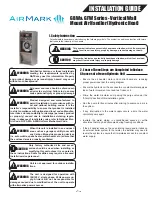
9
Line voltage wiring should be
routed through the access holes
at the top of the air handler.
Proper electrical conduit con-
nection fittings should be used.
Connect the power wiring to the
line side connections on the air
handler. The electrical ground
wire should be connected to the
grounding lug. Ensure both the
field supplied ground wire and air
handler GREEN ground wire are
both secured to the grounding
lug of the air handler (Fig 11B-2).
The aquastat (AQ) jumper must be in the
OFF position at all times, except for when
an aquastat is used. If the jumper is moved
to the ON position without installing an aquastat, the blower
will not be energized.
CAUTION
!
The unit ships with a micro-processor based board which controls
the electrical functioning of the unit. An inspection of the controls is
recommended prior to startup.
Fig.11C-2 provides a schematic of the control board present in the
unit. The units ship from the factory with the aquastat jumper in the
OFF position (right two pins) and the heating selector in the HW
position (right two pins). If an aquastat is used in the application, the
jumper should be changed to the ON position (left two pins).
Note: Terminals T and N located on the top right side of the board
are not intended for field use and should be left disconnected.
Fig 11A-2.
Fig 11B-2.
Fig 11C-2.
During cooling mode operation, indoor blower wire “G” will energize
a time delay relay located on the control board inside the air handler.
After a short time delay period, the time delay relay will send out a 24
volt signal to the low voltage terminal on the motor. (See Schematic
Fig 22-1.) Fan time delay periods are 30 seconds ON delay and 120
seconds OFF delay. The Y wire from the thermostat is not connected
at the air handler. This wire goes directly to the outdoor unit 24 volt
wiring to turn on the outdoor condensing unit when a call for cooling
takes place. The 24 volt common for the outdoor unit circuitry is con-
nected at the air handler brown wire. (See Fig11-1.)
The hydronic heater low voltage wiring terminal “W” is wired directly
from the thermostat to the air handler. The indoor blower, on a call for
heat, will ON delay for a period of 5 seconds. When the call for heat
has been satisfied, the indoor blower will have an OFF delay time
period of 60 seconds.
11B. Two Stage Condensing Units
11C. Jumper Placement
11D. Pump/Valve/Boiler Wiring
Operating CFM based upon each speed tap number is shown on
the electrical wiring diagram of the unit. Final air volume adjustments
should be made by referencing total external static pressure (Table
11B-1).
If the outdoor condensing unit is a two stage model, a field provided
Y2 wire can be connected to the motor using an electrical spade con
-
nector. The number 4 and 5 terminals on the motor are speed taps
that will increase the blower speed for second stage cooling opera-
tion. Both the G and Y2 terminals will be energized at the same time
during a call for second stage blower speed operation. The motor will
run at the speed where the Y2 wire is connected (Fig 11B-1).
Fig 11B-1.
Table 11B-1.
11A. Single Stage Cooling
On units shipped from the factory with a pump installed (Fig 11D-3),
the pump will be energized on a call for heat.


























